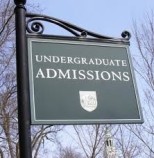|
Strategizing College Essays
The Common Application requires students to select and respond to introspective essay questions. The application demands an insightful, analytical approach to a strategically chosen topic. I use the essay process to develop writing and editing skills, as well as analytical and critical thinking. I do not write the essays. Rather, I guide students in discovering and crafting their personal statement with practical writing skills they will continue to use in school and life.
A rigorously considered, well-written essay in a natural, self-aware voice will significantly distinguish a student from other applicants.
One of the most important things I learned when working at Georgetown Office of Undergraduate Admissions is that selecting the right question and topic allows students to authentically shine, and avoid potential traps. A strong essay can convey the intelligent, insightful individual behind the standardized test scores, extra-curriculars, and demographics.
|
Together with the student's hard work, my strategic approach results in essays and applications that:
- Clearly Define the Applicant, Creating an Effective Profile that Distinguishes the Applicant from the Pack
- Demonstrate Readiness for Academic Success and the College Experience
- Define and Illustrate Applicant Personal Strengths
- Compensate For Weaknesses & Explain Inconsistencies
- Maximize Every Opportunity within the Application Process, (some of which are often overlooked)
There are many opportunities to strengthen your college profile.
I explain how the process really works, and what truly impacts admissions decisions.
Services included in the Application Process:
- Selecting Topics and Shaping Essays That Demonstrate Intellectual Potential and Personal Promise
- Understanding What Admissions Officers Really Care About
- Establishing Priorities & Identifying the Right Schools for the Individual Student
- Communicating Leadership, Talent, Community Service, Jobs, Projects, & Internships for Maximum Effect
- Identifying When Talents and Athletics Can Make a Difference, and How to Play that Game
- The When, Why and How to Prepare for College Trips
- Preparing for On-Campus & Alumni Interviews
- Evaluating and Leveraging “Connections”
- Using Correspondence to Strengthen an Applicant's Case
- Determining Which Standardized Tests are Right for the Individual, When to Take Them & How to Prepare
I assist families in identifying and applying to schools that are right for each student. I guide students in the preparation of compelling applications based on their own strengths, ideas, interests and future potential. However, my job is not only to guide the student and advise the family, but to help maintain a calm, focused approach to the process.
In this competitive climate, strategic guidance can make an enormous difference when trying to distinguish a young person as an individual.
My role is not only to guide the student and advise the family,
but to help maintain a calm, focused approach to the process.
Students frequently fail to recognize the value of many of their life experiences, and neglect valuable opportunities to strengthen their profile. The facts on the ground often run counter to popular wisdom. Families might believe that their applicant will be the irresistible "total package", when there are many more kids who fit that profile than can be accepted. Many believe that sports or connections will have greater impact than is realistic.
There are many great schools, large and small, suited to different students with a wide range of abilities, interests, and goals. One student may belong at a prestigious, rigorous liberal arts college; another may want a small, supportive school. Some students are right for the Ivy League or the great public universities. Others may want a specialized program at an undergrad business or engineering school.
Whatever you have in mind, you will want to plan ahead, and think strategically. This is especially true for any student who wants to go to a well-known school that is a favorite in your high school or geographic region. Each student should have options drawn from a range of schools where they can be happy and succeed.
Freaking out about college in your junior year is not productive; in fact, freaking out is to be avoided in every case. There are solutions to even the most challenging situations. However, it is best to know the issues and requirements as early as possible.




